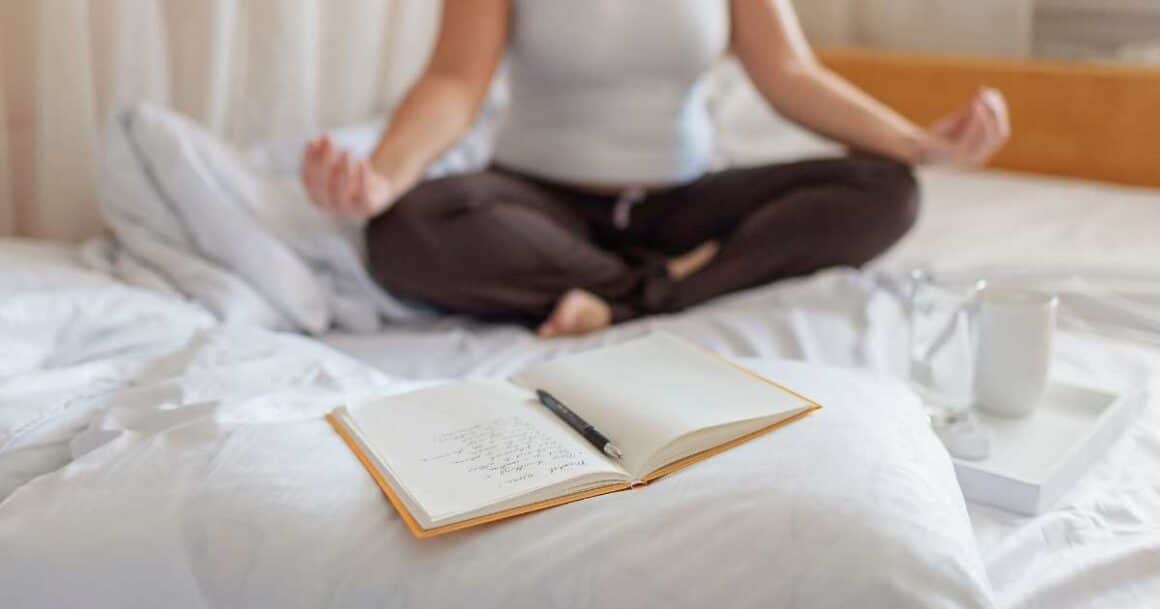How To Create a Stress Management Plan for 2025
In this article, how to Create a Stress Management Plan– I’m laying out a solid step-by-step plan for you to start managing your stress and anxiety.
Here’s the thing: stress is a killer (for real!), so you’ve got to do whatever it takes to kick stress to the curb ASAP.
If you don’t manage stress, stress will “manage” you! And you don’t want that girlfriend.
The first thing on the list-You’ve got to jump in the driver’s seat and take control!
Sound good? Alrighty then, let’s roll!
This post may contain affiliate links. Click to visit policies and disclosures

What is stress?
Stress is a normal human reaction that happens to everyone.
The human body is designed to experience stress and react to it. When you experience changes or challenges (stressors), your body produces physical and mental responses.
That’s stress. Stress responses help your body adjust to new situations.
Stress can be positive, keeping us alert, motivated, and ready to avoid danger.
However, stress becomes a problem when stressors continue without relief or periods of relaxation.
Stress is a part of life.
If you’re struggling to cope with stress, you’re not alone.
In our fast-paced world, it’s easy to feel overwhelmed by stress and anxiety.
The push and pull of work, family, and social obligations can leave us mentally and physically drained.
According to the American Psychological Association, over half of all Americans reported feeling stressed most of the time.
The good news is we don’t have to lay down and die of stress and anxiety.
We can learn to manage stress in our lives by creating a stress management plan!
Why is managing stress important?
Because stress is a killer!
Living with chronic stress can negatively affect our physical and mental health. That’s why it’s so important to find healthy ways to keep our stress under control.
Chronic stress has been linked to various health problems, including heart disease, high blood pressure, diabetes, depression, and anxiety.
It can also weaken our immune system, making us more susceptible to illness.
According to WebMD, there are many, many stress-related health problems (most of which can be avoided by lowing stress in our lives)
Stress-Related Physical and Mental Health Problems:
- Heart disease
- High blood pressure
- Aclecrated heart rate
- Asthma
- diabetes
- Accelerated aging
- Headaches
- Alzheimer’s
- Obesity
- Depression and anxiety
- Panic attacks
- Mood Swing
- Insomnia
- Premature death

Stress Management Works
While the number of health problems related to stress is alarming, there is hope.
Studies suggest that stress management techniques will not only make you feel better, but they might have concrete health benefits as well.
How to Create a Stress Management Plan:
Creating a stress management plan isn’t as hard as you might think.
It’s about taking control of what you can control and learning to respond well to what you can’t control.
Simply put, following these stress management strategies puts you in the driver’s seat. Being proactive as opposed to reactive all the time.
This leads me to the first and perhaps the most important stress management steps. Prevention.

1. Prevention.
The number one stress management strategy is prevention.
Prevention is everything.
Proactive steps to prevent stress in your life:
Self-Care
Taking care of yourself will help maintain your physical, emotional, and mental reserves to prevent and manage stress.
A solid self-care routine is in place, and you diligently practice self-care. This includes regular quality sleep, exercise, relaxation, eating well, and more.
Related: 26 Practical Ways to Practice Self-care
Get a Check-up
If you’re not 100% physical, stress is harder to manage.
That said, get a physical. Make sure your blood pressure and heart rate are A-Ok. Have your doctor run a full blood panel.
Just say NO.
Someone once told me, “no is a full sentence.” And they were right.
Learn time management.
Poor time management causes a lot of stress. Develop time management strategies like using a day planner and time blocking to get your schedule in control and limit stress.
Check out this article: How to use time blocking for more information
Avoid Toxic People
Some people will just rub you the wrong way, and that’s ok.
But if you feel stressed or overloaded by another person’s energy, do what you can to distance yourself from them.
Related: How to Set Healthy Boundaries in Toxic Relatiionships

Stress Management Essentials
Control your comfort + environment
Being uncomfortable can make you feel stressed.
Next time you feel stressed or anxious, think about how you feel. How’s the temperature? Are your clothes comfortable? What about the bra?
Maybe you should take it off. Just Sayin’ 🙂
In addition to controlling your level of physical comfort, avoid environments that make you anxious, such as watching the evening news or sitting in traffic.
I have cut way back on the amount of news media I consume, and I’ve gotta tell ya-I’m feeling much, much better!
Tidy up!
When your life is chaos, and things are in disorder-we feel more stressed.
Having a clean and tidy home helps reduce stress by giving us a sense of control over our lives.
Know your stress triggers.
Stress triggers are chemicals and hormones that surge throughout the body. Stress triggers your fight-or-flight response to fight the stressor or run away from it.
Many stress triggers in life are unavoidable, like the death of a loved one, moving, health problems, divorce, financial problems, and more.
What I’m talking about here are avoidable stress triggers.
Examples of avoidable stress triggers:
- Low blood sugar. Avoid getting hangry by eating small meals throughout the day.
- Loud or irritating music. If you are stressed, try calming and peaceful music.
- Toxic people. If someone stresses you out, limit your exposure to that person.
- Too much Junk light (too much screen time)
- Lack of sleep. Improve your sleep hygiene.
Lower expectations
Unrealistic expectations get us in big trouble and are the buzz kill of life, my friends!
Developing unrealistic expectations of ourselves, others, and situations can create friction, misunderstandings, frustration, and stress.
Try to keep your expectations low to avoid stress.
Stay properly hydrated
Dehydration can greatly affect how we feel both physically and mentally.
Next time you feel stressed, ask yourself- Have I had enough water today? Chances are, you could be dehydrated.
Related: The many benefits of drinking enough water

2. Practice stress management techniques
While it’s impossible to eliminate all stress from our lives, we can do some simple things to help reduce stress at the moment.
These methods can help you find peace and calm during a stressful day:
- Deep breathing exercises
- Visualization techniques
- Mindful meditation
- Progressive muscle relaxation
- Using a weighted blanket
Breathing exercises for stress and anxiety
That saying, “just breathe,” is a clinique for a reason.
It may sound too simple, but it’s true.
Deep breathing is one of the quickest and easiest ways to reduce stress.
When we’re stressed, our breathing becomes shallow and rapid, which can lead to feelings of anxiety and dizziness.
Taking a few deep breaths can help slow your heart rate and calm your nerves.
Deep breathing exercise for stress:
1. Find a comfortable, quiet place to sit or lie down.
2. Close your eyes and take slow, deep breaths through your nose. Focus on breathing deeply so that your lungs are filled with air.
3. Hold your breath for a few seconds, then slowly exhale. When your exhales are longer than inhales, it helps signal your brain that it is time to relax.
4. Repeat this process for a few minutes until you feel more relaxed.
Tip: The 4-7-8 breathing technique is also a popular deep breathing exercise. To do this method, breathe through your nose for 4 seconds, hold your breath for 7 seconds, and then exhale out of your mouth for 8 seconds.
Visualization techniques for stress and anxiety
Visualization is a relaxation technique that creates a mental image of a peaceful place or situation.
I know that when I’m stressed, taking a few minutes to visualize myself in a calming environment helps me lower my anxiety and stress levels a ton!
How To do a visualization exercise:
1. Close your eyes and take several slow, deep breaths.
2. Visualize a peaceful place you have been to or imagine a tranquil scene.
For example, you might picture yourself lying on a beach, floating in a pool, or walking through a meadow.
3. Pay attention to the details of your surroundings. What do you see in your mind’s eye? What do you hear? What do you smell? How do you feel?
4. Continue to breathe deeply and focus on the peaceful image until you feel more relaxed.
Related: The Best Self-Care Apps for Women
Progressive muscle relaxation
Progressive muscle relaxation (PMR) is a technique that involves tensing and relaxing different muscle groups in your body.
This can help you identify when your muscles are tense and how to release that tension.
How To do a PMR exercise:
1. Start by sitting or lying down in a comfortable position.
2. Take a deep breath and tense your muscles as you exhale. Hold the tension for 5-10 seconds.
3. As you inhale, slowly release the tension and feel your muscles relax.
4. Focus on one muscle group at a time, working your way from your toes to the top of your head.
5. Repeat the process for each muscle group until you feel more relaxed.

Mindfulness meditation
Mindfulness meditation is another popular stress management technique focusing on the present moment.
This practice has been shown to help reduce cortisol (a stress hormone) levels in your body and improve overall mood.
How to do a mindfulness meditation exercise:
1. Find a comfortable place to sit or lie down in a quiet place
2. Close your eyes and begin focusing on your breath. Notice the sensation of inhaling and exhaling.
3. try to clear your mind of any thoughts or worries as you breathe. If a thought comes into your mind, acknowledge it and let it go.
4. Continue focusing on your breath for the duration of the exercise. Open your eyes and take a few deep breaths when you’re finished.
If self-guided meditation isn’t effective for you, try listening to a guided meditation on YouTube or a meditation app.
Using a weighted blanket
I was initially skeptical when I heard about weighted blankets and how they can reduce stress and anxiety.
But I gotta say- I love my weighted blanket!
Here’s how a weighted blanket works to ease anxiety and stress:
The pressure of weighted blankets puts your autonomic nervous system into “rest” mode, reducing some anxiety symptoms, such as a quickened heart rate or breathing.
I always use my weighted blanket when watching TV or taking a nap. I find that if makes me feel comforted and safe, which ultimately lowers my stress levels.
3. Ask for help.
When struggling with stress, reaching out for help is a good idea.
This could be a trusted friend, family member, life coach, counselor, or therapist.
Working with a therapist or a life coach is a powerful way to improve mental health and get your stress under control!
I have worked with a therapist off and on for many years and highly recommend it!
Here’s how to find the right therapist for you.

4. Thought life + Mindset
Think about what you’re thinking about.
Mindset refers to how you think and feel about yourself and your life.
Your experiences and circumstances, such as your upbringing, relationships, educational background, or social status influence your mindset.
Mindset or thought-life is also influenced by how we think, feel, and talk to ourselves.
Through self-reflection and self-care practices such as meditation or journaling, it is possible to cultivate a mindset rooted in self-love and self-acceptance.
Having a healthy mindset will not only lead to self-love but will help to relieve stress.
Related Self-Care Articles
- Self-Care Ideas for Women
- Life Skills Every Woman Should Have
- 31 Inspiring Daily Journaling Prompts
- The Eight Types of Self-care
- Self-Care Habits for Mental Health
- 100 Life Essentials for Women
- Setting Boundaries with Toxic People
- The 5 Love Languages for Couples
- Cultivate Gratitude Every Daily
- Warning Signs You’re Ignoring Your Intuition
- 100+ Positive Affirmations for Self-Love
- The Benefits of Daily Meditation
- How to Start a Self-care Routine
- Self-Limiting Beliefs that Hold us Back
- How to Reinvent Yourself at 50 and Beyond
5. Attitude
Attitude is an all-encompassing term that defines your outlook and approach to life. It includes your inner thoughts and outward expressions.
If your overall attitude is in the toilet, you are more likely to experience a higher stress level in your life.
The solution? You need to shift your attitude. How?
The best way I know to adjust an attitude is by practicing gratitude.
Take a few minutes every day to reflect on all the things you appreciate in your life. This will help you to keep things in perspective.
Cultivate gratitude in your life.
6. Cultivate gratitude
Being grateful or thankful for the blessings in our lives is a surefire way to help manage stress.
By definition, gratitude is the quality of being thankful, readiness to show appreciation for, and returning kindness.
Cultivating and practicing gratitude can take practice.
The more we practice being grateful for the blessings in our lives, the better we get at being thankful, and it becomes second nature.
And the more we focus on gratitude, the less stressed we become.
Related: How to Practice Gratitude Daily

7. Do what you love
Do things that you love as often as you can.
This could mean changing your career if you hate your job or if the commute is bad. Life is too short to hate your job or sit in traffic daily.
In addition, to do something that you love for a living, consider starting a new hobby. A hobby is considered an activity done regularly in one’s leisure time for pleasure.
Hobbies have greatly enriched my life over the years and have kept me sane!
Related: Need a hobby? Fun Hobbies for Women

8. Give Grace
Giving yourself and the people in your life a break will go a long way in reducing stress.
In today’s crazy, mixed-up world, we are often too hard on ourselves and the ones we love.
The cure?! Remember this:
- When you mess up: Remember the lesson, not the mistake.
- Done is better than perfect.
- No one is perfect.
- You can do anything but not EVERYTHING.
- Self-care is not selfish.
- You are enough.
- Let that Sh*t go. Forgive and move on.
- Love always believes in the best.

9. Have some fun + laugh!
If you are suffering from stress, you’ve got to add some fun to your life! Pronto!
Having regular fun in your life can help you feel less overwhelmed by the stressors you face.
This can help you change your attitude toward your lifestyle stressors so that you’re less reactive to stress when you experience it.
When you are having fun and laughing, your stress levels decrease.
The more fun and the more laughter in your life, the better!
Check out this article: The Many Health Benefits of Laughter.
10. Exercise
Exercise can be a great way to reduce stress and improve overall health.
It releases endorphins into the body, which help to boost mood and promote feelings of well-being.
To reduce stress in just 5 minutes, try incorporating some form of exercise into your routine, such as taking a brisk walk or doing light stretching.
And remember that even small amounts of physical activity can be beneficial—so don’t feel like you need to spend hours at the gym to experience stress-relieving benefits!
Related: The Eight Types of Self-care
Related Articles to Manage Stress:
- Best Self-care: Mind, Body + Soul
- 100 Things to Do When You’re Bored
- 10 Things to Do First Thing in the Morning
- How to Reinvent Yourself at 50 and Beyond
- 100+ Affirmations for Self-Love
- How to Develop a Growth Mindset
- Self-Limiting Beliefs Holding Your Back
- Healthy Habits to Start Now!
- Awesome Be Kind to Yourself Quotes
FAQs Tips on How to Manage Stress
Why should I care about stress management?
Well, good stress management is your ticket to a smoother ride through the ups and downs of life. It helps you stay composed and handle whatever comes your way.
How do I know if stress is messing with me?
Signs of stress are like little signals from your body—irritability, fatigue, changes in sleep. They’re indicators that it’s time to take a breather.
Any quick fixes for stress?
Absolutely! Quick stress fixes are your on-the-go solutions. Try deep breathing, muscle relaxation, or just taking a moment to reset when things get hectic.
Do lifestyle changes help with stress?
It’s not rocket science, just common sense. Eating well, staying active, getting enough sleep, and nurturing social connections can significantly ease the burden of stress.
When should I call for professional help?
If stress becomes a persistent companion, seeking professional help is wise. They have the expertise to guide you through effective stress management.
Can stress be, like, a good thing?
A bit of stress can be a motivator, but too much is like an uninvited guest. It’s about finding the right balance for a healthy and productive life.
Stress Management Essentials
Conclusion: How to Create a Stress Management Plan
I am confident that by implementing these 10 steps to create a stress management plan, you’ll experience a significant decrease in your stress levels.
So, what’s the initial step to kickstart this stress-busting journey?
My recommendation: Start by tackling the small stuff.
- Deep Breathing: Take a few moments each day to practice deep, intentional breathing.
- Quick Breaks: Incorporate short breaks into your routine to stretch or take a brief walk.
- Mindfulness: Try incorporating mindfulness techniques into your day, even if just for a few minutes.
- Prioritize Tasks: Break down your to-do list and focus on one task at a time.
- Connect: Spend a few minutes connecting with friends or loved ones.
You might be amazed at how these minor adjustments can bring about substantial positive changes!
Here’s to less stress and more peace!
XO, Christine

I’ve been keeping it real since 1963. 😊
I’m a child of God, devoted wife, proud mama and grandma, full-time creative, domestic engineer, and passionate self-care enthusiast.
I’m purpose-driven and do my best to live each day with intention—whether shopping for treasures, painting in my art studio, digging in the garden, or cooking up something yummy for my family.
I’m always up for a good chat and love collaborating with fellow creatives and brands.
Let’s connect—don’t be shy!












